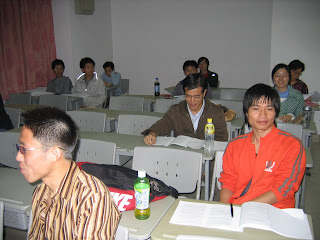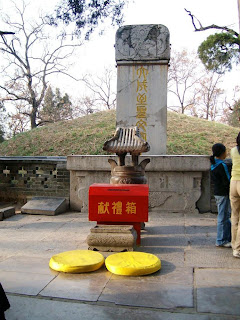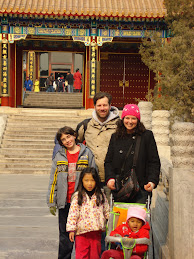The picture below is probably not your image of a Chinese university. You might think of traditional Chinese designs with upwardly sloping tile roofs that have dragons festooning the eaves. Or, you might think of the god-awful Soviet era functionalism and the (possibly worse) cement block and white tile exteriors that are much too common in China.

On the other hand, if this is your image of a 19
th century German Catholic church, you would be right.
Shandong University began as a mission school by German immigrants and the church still stands and still has daily masses - although all in Chinese now. The church is in really good shape and beautiful inside (they asked me not to take pictures), but also quite a surprise at a Chinese institution.
I traveled north to Jinan in
Shandong Province [which means 'east mountains'] to give some lectures at the university - invited by the prompting of a fellow
Fulbrighter there. The school has 7 different campuses and a total of about 60,000 students (and not the largest in China!).
Below is the philosophy department office, with pictures of Karl Marx and Confucius over the doorway. It was too
incongruent to pass up.

Here I am shamelessly posing in front of the sign advertising my lectures. The sign is all in Chinese except for my name. I don't think it came out as clearly as I had hoped.

I flew in to Jinan very late on Thursday night, getting to the campus hotel at about 2 am. The next day I gave a talk on Peirce and sign-theory from 10-12 in the morning, and then a talk on race and identity from 2-4. There were about 30-35 people at each talk and the mix of philosophy and politics students generated some interesting discussions.
These trips are partly funded by Fulbright and the nice part is that after you are done lecturing the school gives you off to a student who then takes you sightseeing for the weekend. On Saturday, we visited
Qufu, the hometown of Confucius (I'll blog about that another day soon). On Sunday, "Chris" [Chinese name unknown], took me around Jinan - the City of Springs.

The shot above is entering the old street that has a lot of traditional housing, vendors in all the alleys, night markets, etc.
Below you see a take on the usual street food in China. You can get a skewer with something on it and they fry it up for you so that you can nosh on it as you stroll the streets.

I passed on the squid and shrimp on a stick, but was particularly puzzled by the crabs on a stick, since it is unclear to me why you would want to eat that while walking. Chris said that you have to break them off and suck the meat out of the shell - which doesn't strike me as a strolling activity, but then I am not Chinese.

Here is a spring in the middle of a very old neighborhood. This is called "The Prince's Pool" because all the area was owned by some prince and nobody could swim in the spring except for him. There were a good 12-15 people swimming. Although it was mid-March in the north, the temperature in the spring is a little warmer (although not a hot spring). It might be hard to see but there are women doing laundry in the pool as well. There was a generally festive atmosphere about the place, especially as it was a warm spring Sunday and people were happy to be out in the sun.

Above is a gate into
Daming Lake [if I am correct about the characters, it just means "big clear lake"], the biggest body of water in the city. Lots of boats were out on the water. All the springs drain into
Daming Lake, and, since Jinan is in a valley the mountain waters drain here too.

Above is a view of the area center with a strange looking sculpture at the center. I say that it is strange because it is supposed to be symbolic of Jinan but I couldn't decipher exactly why. Theories abound.
Right next to this area we walked into a lovely green spot,
Bauto Spring Park. And in the open, in a small pool, were several seals [!] swimming around. [Note: they may be sea lions. I confess that I don't know the difference.]

This is the most famous spot of the park where three springs bubble up to the surface. The park was filled with people, especially multi-generational families with small children.

In some of the recesses of the park there were small courtyards with apricot trees in bloom, and other green and flowering plants. The courtyard below had Magnolias in bloom. The rooms that surround each courtyard were filled with various artworks. Mostly either large calligraphy works or very traditional Chinese paintings of birds on bamboo or misty mountain scenes.

After leaving the park we headed over to Nancy's apartment. She is a fellow
Fulbrighter and she should be coming to
Xiamen to give some talks in May. Nancy was recently in Xi'an, which has a fairly large Muslim population and she bought these Muslim hats in the market there, which of course we had to try on.

This is, left to right,
Zhang, Chris, myself and Nancy. Yes, we know that we all look foolish. We don't care. These students study political science. Chris and I had interesting discussions all day about China, the west, politics and economics. He studies politics and economics and focuses on a kind of Milton Friedman-style economic theory.
Zhang, who is smiling in the photo below, is writing his Masters Thesis on Cambodia during the Pol Pot regime [lovely!].

This is a favorite hangout of the group. It's really a pretty messy parking lot where they BBQ skewers and serve draft beer. We had a lot of fun. The girl above is 'Bing-Bing' [which really means Ice-Ice] and she comes from
Heilongjiang Province which is really far north - and very cold. It is the province of the city of Harbin, which many people know from its yearly ice festival. If you have never heard about the Harbin ice festival you should look it up and see some photos. People who have been there say it is incredible - and incredibly cold.
As a note interest, Nancy and I and various other professors had been discussing politics all weekend in the evenings and at dinners. Nancy thought that the Olympics would lead to some kind of political action and protests of some kind or other. We assured her that such would not be the case, especially in Tibet or other regions in China. Well, by Sunday evening we found out that we were wrong and news of the riots in Lhasa came out. Luckily Nancy hadn't found out by the time I left for
Xiamen, or I would've never heard the end of my political naivete.


























































